- Consider the following network topology where the
home network
of the nomadic host can be reached
through
two different routers
(Multiple entry points are used to provide better reliability - if one router dies, the other one will keep you connected on the Internet)
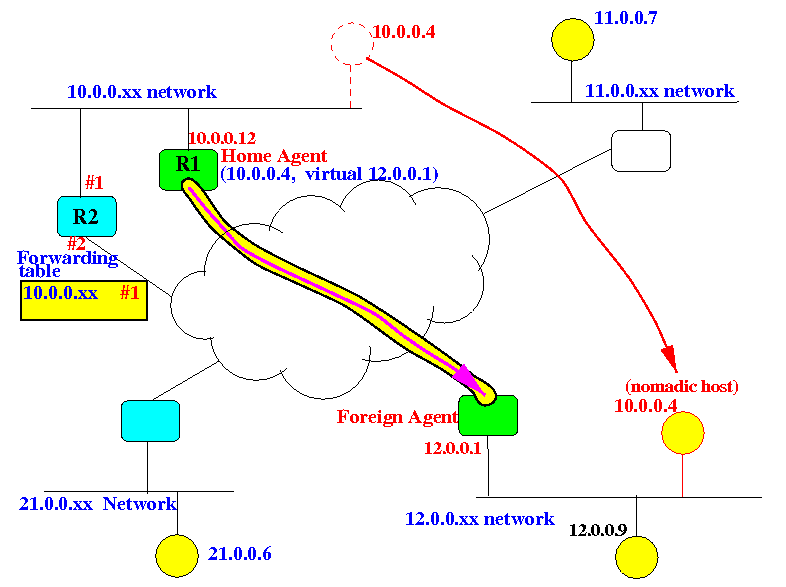
Only ONE of the routers is the home agent (in the figure, we assume that the node 10.0.0.12 is the home agent).
- Consider now a message that is destined to
the mobile host (10.0.0.4) but received
through the router that is NOT the home agent:
- A message that arrive through a router
that is NOT the home agent
does not have the tunnel entry
in the routing table.
This router will therefore perform a "normal" IP forwarding.
The IP forwarding algorithm is given here: click here
- Because port #1 of router R2 is attached to network 10.0.0.xx,
it will have the following entry in the frowarding table:
Network | Port# ------------+------------- 10.0.0.xx | #1(If you need to refresh on forwarding and how forwarding entries are used, check in this webpage: click here)
- Because the destination address of the IP packet
(= 10.0.0.4, the nomadic host) is on the 10.0.0.xx network,
the router will deliver the IP packet over interface #1
directly to the host 10.0.0.4 as follows:
- Determine the layer 2 address (a physical MAC address
- e.g., an Ethernet address, an 802.11 address, token ring address)
of the host 10.0.0.4.
- Transmit the IP packet in a MAC frame using the MAC address obtained in step 1.
(This procedure has already been discussed the Example 1 in IP forwarding, click here)
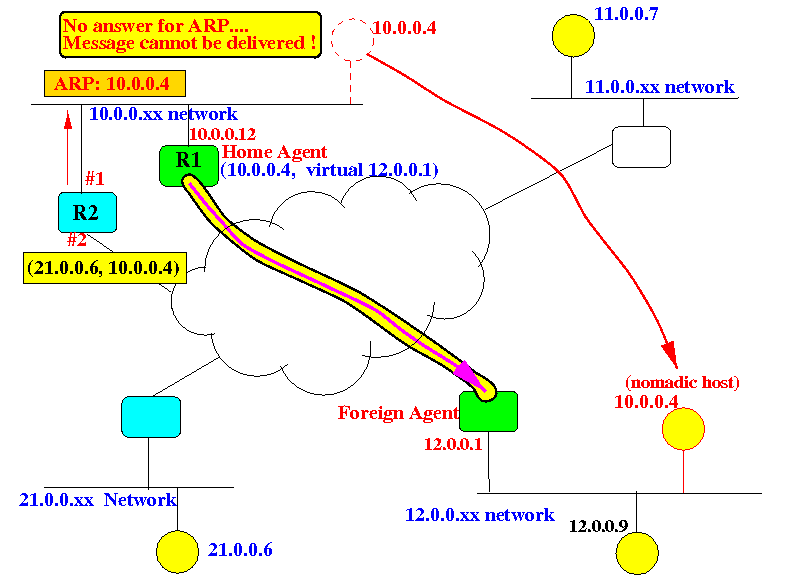
- Determine the layer 2 address (a physical MAC address
- e.g., an Ethernet address, an 802.11 address, token ring address)
of the host 10.0.0.4.
- As you know, the procedure to determine a MAC address is
to use the
ARP protocol
(click here)
So:
-
router R1 sends out an ARP request for the IP address 10.0.0.4 and
......
Oh uh.... no one home....
(BTW, if there is no reply for an ARP request, the IP message cannot be delivered and the only thing that router R2 can do is to drop the IP message for host 10.0.0.4.... and send back an ICMP ( click here) "host unreachable" message).)
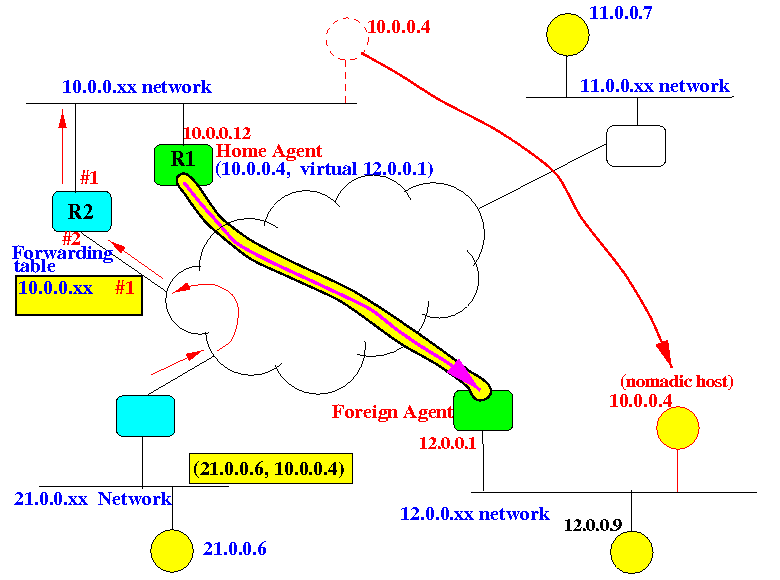
- A message that arrive through a router
that is NOT the home agent
does not have the tunnel entry
in the routing table.
- In the above example, we see that a non-home agent of
a home network that have multiple connections to the Internet,
cannot find the mobile agent.
Also, the non-home agent CANNOT tell whether or not the host is away from home...
The ONLY node that is aware of this fact is the home agent
- When you understand the problem, finding the solution is usually
pretty simple.
The solution to the above "gone away from home" problem is to have the home agent that KNOWS that host (10.0.0.4) has left the home network, reply to the ARP request !!!
- The goal is to have
NON-home agent
router R2 send the IP message destined for 10.0.0.4
to
home agent
router R1, so that R1 can tunnel the message to the nomadic
host 10.0.0.4.
To accomplish this, the ARP reply that router R1 sends will contains R1's own MAC (Ethernet) address):
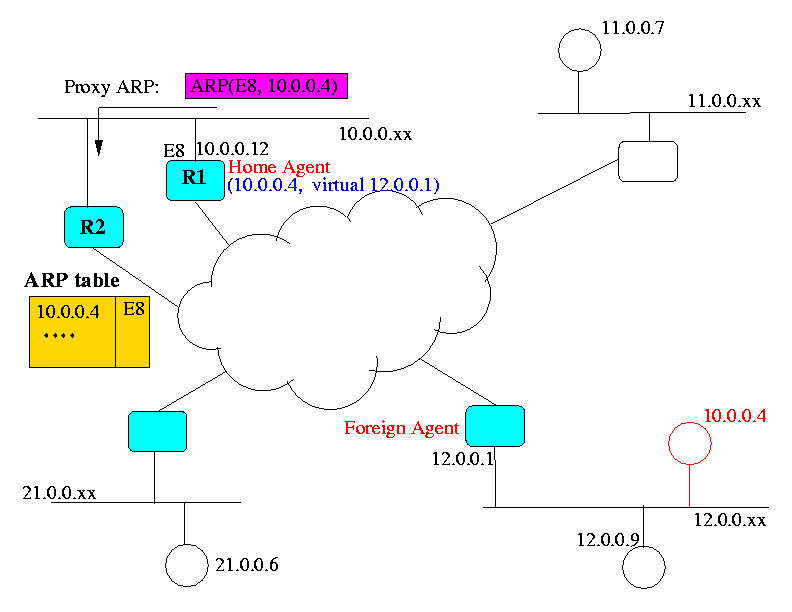
- Note that this is not a "normal" ARP reply.
- The normal ARP reply from router R1 will contain router R1's IP address
along with its MAC (Ethernet) address.
This abnormal ARP reply contains
someone else's IP address !
- The act of "answering a request on behave of someone else"
is known as a proxy:
Word: proxy proxy \'pra:k-se-\ n [ME procucie, contr. of procuracie, fr. AF, fr. ML procuratia], alter. of L procuratio procuration 1: the agency, function, or office of a deputy who acts as a substitute for another 2a: authority or power to act for another 2b: a document giving such authorization; specif : a power of attorney authorizing a specified person to vote coporate stock 3: PROCURATOR - proxy aj
- The above technique (having one entity answer the ARP request for another) is called Proxy ARP
- Note that this is not a "normal" ARP reply.
- The
away-from-home problem
encountered by router R2 is solved
with proxy ARP as follows:
- The home agent
replies to the ARP request in behave of the mobile host
- When the non-home agent
router R2 receives the ARP reply (which contains
R1's Ethernet address),
R2 will send the IP packet to R1
- The IP packet destined for the mobile host (10.0.0.4) arrives at the home agent router R1; and because of the virtual entry in R1's routing table, R1 will again tunnel the packet towards the mobile host (10.0.0.4)
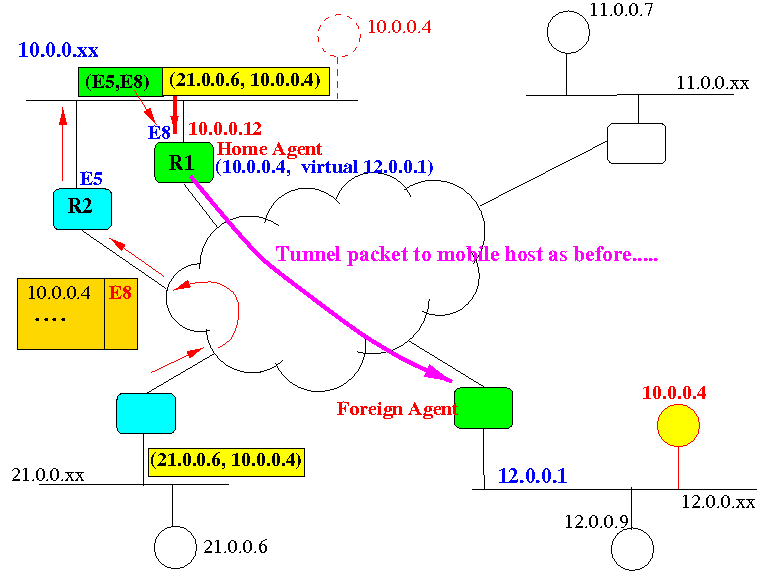
- The home agent
replies to the ARP request in behave of the mobile host
- Final note:
- The solution of the IP mobility problem thus allows a mobile host to keep its existing TCP connection alive throughout its trip - as long as the foreign network can provide the necessary IP mobility support